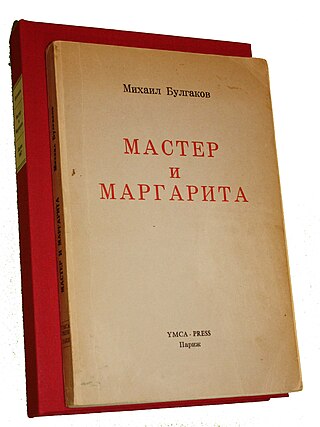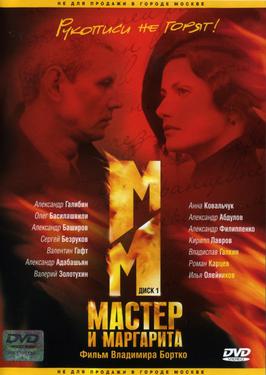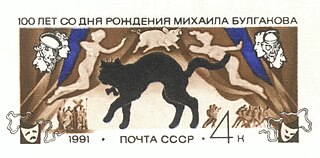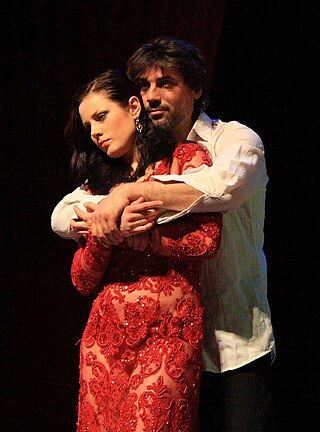
Mikhail Afanasyevich Bulgakov was a Russian, later Soviet writer, medical doctor, and playwright active in the first half of the 20th century. He is best known for his novel The Master and Margarita, published posthumously, which has been called one of the masterpieces of the 20th century.

The Master and Margarita is a novel by Soviet writer Mikhail Bulgakov, written in the Soviet Union between 1928 and 1940. A censored version, with several chapters cut by editors, was published in Moscow magazine in 1966–1967, after the writer's death on March 10, 1940, by his widow Elena Bulgakova. The manuscript was not published as a book until 1967, in Paris. A samizdat version circulated that included parts cut out by official censors, and these were incorporated in a 1969 version published in Frankfurt. The novel has since been published in several languages and editions.

Woland is a fictional character in the novel The Master and Margarita by the Russian (Soviet) author Mikhail Bulgakov, written between 1928 and 1940. Woland is the mysterious foreigner and professor whose visit to Moscow sets the plot rolling and turns the world upside-down.

The Master and Margarita is a Russian television mini-series produced by Russian television channel Telekanal Rossiya. based on the novel of the same name, written by Soviet writer Mikhail Bulgakov between 1928 and 1940. Vladimir Bortko directed this adaptation and was also its screenwriter. The series tagline is "Manuscripts do not burn!".

Mikhail Bulgakov Museum is a museum in Kyiv, Ukraine, dedicated to Kyiv-born Russian writer Mikhail Bulgakov.

The Pashkov House is a neoclassical mansion that stands on a hill overlooking the western wall of the Moscow Kremlin, near the crossing of the Mokhovaya and Vozdvizhenka streets. Its design has been attributed to Vasily Bazhenov. It used to be home to the Rumyantsev Museum—Moscow's first public museum—in the 19th century. The palace's current owner is the Russian State Library.
The Bulgakov Museum in Moscow is a writer's house museum which commemorates the life and work of author Mikhail Afanasyevich Bulgakov in an apartment where he lived in Moscow, Russia, and in which he set portions of his novel The Master and Margarita. Graffiti, including text from the novel and drawings of its characters, have decorated the external walls and stairwells of the apartment building since the beginning of perestroika. It is located about two blocks from Patriarch Ponds, the scene of the opening chapter of the novel, where the Moscow city government had planned to erect statues commemorating the novel. It is close to Mayakovskaya metro station

The Master and Margaret is a 1972 Italian-Yugoslav film directed by Aleksandar Petrović, loosely based on Mikhail Bulgakov's 1940 novel of the same name, although it mainly focuses on the parts of the novel set in 1920s Moscow.

The Master and Margarita is a Polish television production of Polish Film Producers Teams, based on the novel of the same name by Mikhail Bulgakov.

The Master and Margarita is a Russian film made by director Yuri Kara, based on the novel of the same name by the Russian author Mikhail Bulgakov.
Azazel, a demon from Jewish mythology, has been developed into characters in popular culture.

The Bulgakov House is situated on the ground floor of Bolshaya Sadovaya ulitsa no. 10 in Moscow, in the building where the Soviet writer Mikhail Bulgakov used to live, and in which some major scenes of his novel The Master and Margarita are set. The museum was established as a private initiative on May 15, 2004.
Incident in Judaea is a British film made by Paul Bryers, based on the novel The Master and Margarita by the Soviet author Mikhail Bulgakov. The film only adapts the biblical parts of the novel. It was broadcast by the British Channel 4 on 31 March 1991.

Behemoth the Cat is a character from the novel The Master and Margarita by the Russian writer Mikhail Bulgakov. He is an enormous demonic black cat who speaks, walks on two legs, and can even transform to human shape for brief periods. He has a penchant for chess, vodka, pistols, and obnoxious sarcasm. He is evidently the least-respected member of Woland's entourage; Margarita boldly takes to slapping Behemoth on the head after one of his many ill-timed jokes, without fear of retribution. He is known for his jokes, which he never stops telling. Russian word begemot means hippopotamus, however his name refers to the legendary Biblical monster.

Master is a fictional character from the novel The Master and Margarita by the Russian writer Mikhail Bulgakov.
Vladimir Viktorovich Orlov was a Russian novelist, notable for his fantasy novel Danilov, the Violist.
Korovyev is one of Woland's entourage in Mikhail Bulgakov's novel, The Master and Margarita. He presents himself to others as "professor" Woland's "assistant and translator," and is capable of creating any illusion. His appearance is characterized throughout the book by a lengthy build, a jockey's cap, a mustache, and a pince-nez with one cracked lens and the other lens missing. He is alternately depicted wearing a checkered jacket and checkered trousers.

The Master and Margarita is a Russian fantasy-drama film directed by Michael Lockshin and based on Mikhail Bulgakov's novel of the same name. It stars August Diehl as Woland, a diabolical foreigner who visits Moscow, Yevgeny Tsyganov as the eponymous Master, Yuliya Snigir as Margarita, the Master's lover and Claes Bang as Pontius Pilate.

Elena Sergeevna Bulgakova was a Soviet author and intellectual. In collaboration with her husband, Mikhail Bulgakov, she participated in the writing of The Master and Margarita, a central work of Russian literature. Additionally, she is depicted in the novel as the character Margarita.














